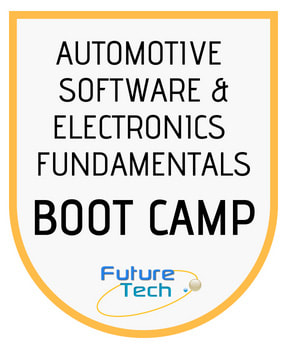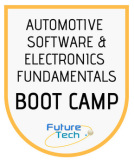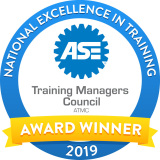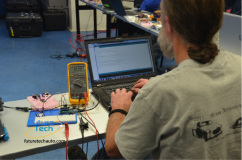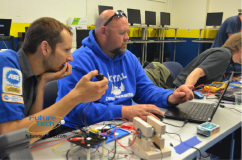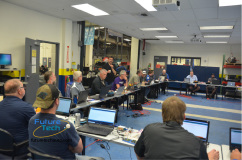- Access Hands-On Training
- >
- Fundamentals: Automotive Software & Electronics Boot Camp
Fundamentals: Automotive Software & Electronics Boot Camp
SKU:
$2,195.00
2195
3949
$2,195.00 - $3,949.00
Unavailable
per item
Dates and Locations:
Lansdale, PA
September 13-17, 2021 (Sponsored/Hosted by MACS)
Portland, OR
July 12-16, 2021 (Portland Community College)
VIRTUAL BOOT CAMP
Rolling Quarterly Schedule (Info Coming Soon!)
*NOTE* Please provide the name, email address, and phone number for the individual(s) you are registering in the "NOTE TO SELLER" section at checkout.
Lansdale, PA
September 13-17, 2021 (Sponsored/Hosted by MACS)
Portland, OR
July 12-16, 2021 (Portland Community College)
VIRTUAL BOOT CAMP
Rolling Quarterly Schedule (Info Coming Soon!)
*NOTE* Please provide the name, email address, and phone number for the individual(s) you are registering in the "NOTE TO SELLER" section at checkout.
- Download the course flyer here
- If you need to submit a purchase order or secure a quote, please do so here.
- Information regarding accommodations (preferred hotels or room blocks, if possible) will be provided by our customer service team after your registration is received.
- Boot Camps in Portland are in association with Advanced Vehicle Training Group Northwest (AVTGNW)
- Boot Camps in Lansdale, PA are sponsored and hosted by Mobile Air Conditioning Society (MACS) Worldwide
- Thinking of registering for a Fundamentals+Intermediate bundle? Check out the Intermediate Boot Camp here.
Please review the course cancellation and refund policy prior to submitting your registration. Please contact us with any inquiries.
Note to Participants:
Students will be responsible to bring their own laptop computer to the course (with at least one operating USB port) for the purposes of operating the MC and permit software applications to be installed for developing S/W code. The students should be prepared to bring their own oscilloscope and/or DVOM to work with the electronic devices and circuits. This course is designed for individuals with minimal or no experience in S/W development or coding, and minimal to average experience with analog & digital electronics circuits and devices.
Students will be responsible to bring their own laptop computer to the course (with at least one operating USB port) for the purposes of operating the MC and permit software applications to be installed for developing S/W code. The students should be prepared to bring their own oscilloscope and/or DVOM to work with the electronic devices and circuits. This course is designed for individuals with minimal or no experience in S/W development or coding, and minimal to average experience with analog & digital electronics circuits and devices.
Fundamentals Boot Camp Overview
Read the editorial in ACtion Magazine (Published by MACS): What I Learned from Automotive Software & Electronics Boot Camp - Tim Iezzi
Automotive Instructors and Technicians are constantly being challenged by changes in electronics systems and control software in advanced automotive systems. This course contains lecture with significant hands-on project content that will make for the perfect learning environment! Using the popular Arduino Microcontroller, participants will be introduced to MC and electronics to build new hardware (H/W), firmware (F/W), & software (S/W) knowledge that can be used directly with automotive systems. This course has the following topics to address these challenges that confront automotive industry service and diagnostic professionals:
As part of the course each participant will receive a MC, software, a USB cable that they take with them when the course has been completed. This will afford the opportunity for participants to continue learning after completing the course!
- Microcontroller based electronics projects will be built in the class within a fun and interactive environment
- This course will teach participants how they can inexpensively and quickly create their own testing and diagnostic tools.
- Provide participants sufficient fundamental knowledge and skills that would permit them to develop their own microcontroller based applications and hardware interface tools that can be used for analyzing and diagnosing most automotive systems
- Learn how external MC systems can be built to be used with a scan tool or on-board vehicle system to manipulate or change systems operation for the purposes of circuit analysis and diagnostics or building vehicle “bugs” for automotive courses
As part of the course each participant will receive a MC, software, a USB cable that they take with them when the course has been completed. This will afford the opportunity for participants to continue learning after completing the course!
- The lecture and significant hands-on project content in this course, using the popular Arduino MC, will introduce participants to the world of Electronic Devices, MC, Software Writing, and Software Coding.
- Automotive Instructors will develop skills to develop MC based classroom simulators, demonstrators, and develop student projects in a fun environment. Simulator and demonstrator systems are significant investments for the modern automotive classroom and this course will teach participants how to inexpensively create their own simulator and demonstration systems.
- Automotive technicians will develop skills to develop MC (software) based diagnostic systems that can be used to manipulate or control vehicle systems. Whether the technician wants to monitor control systems, inputs, or outputs this class will instruct them how to quickly make control systems to do it! The technicians will also learn how simple electronic and software circuits can be used with the Scan Tool to develop circuits that can make complex diagnostics easier!
- Information essential for individuals that want to architect vehicle “bugs” for courses or, develop circuits and software to focus on specific diagnostic objectives.
- Provide participants enough fundamental knowledge and skills that would permit them to develop microcontroller based applications and hardware interface tools for most automotive systems.
Daily Boot Camp Activities
Monday
All Day Tuesday & Wednesday Morning
A continuation of Monday (Day 1) - Analog and Digital Signal Conditioning: Its purpose in connecting the MC to the outside world or motors, relays, sensors, other controllers, networks, and more: Why and What is needed, and How to build some simple Signal Conditioning circuits to interface with the MC:
Wednesday Afternoon & All Day Thursday
Friday Morning & Afternoon
- Vehicle Control and Electronic Systems Architectures
- H/W and S/W Interactions in Control Systems
- Analog and Digital Component Operation: High level operation, usage, and integration with a MC
- Analog and Digital Signal Conditioning: The purpose of Signal Conditioning is to ensure that external signals can safely connect the MC to the outside world of motors, relay drivers, sensors, other controllers, networks, and more: This course will cover Why and What is needed, and How to build Analog Digital Signal Conditioning circuits that will interface with the MC. As part of learning and interfacing Signal Conditioning with the MC, it is necessary that participants understand the operation and application of electronic devices. The focus will be how to use these devices for building Signal Conditioning and Control Systems, and how to use these devices with a MC.
- Electronic Devices: Resistor, Resistor Network, Rectifier Diodes, and Zener Diodes, and Opto-Isolators
All Day Tuesday & Wednesday Morning
A continuation of Monday (Day 1) - Analog and Digital Signal Conditioning: Its purpose in connecting the MC to the outside world or motors, relays, sensors, other controllers, networks, and more: Why and What is needed, and How to build some simple Signal Conditioning circuits to interface with the MC:
- Electronic Devices Signal Conditioning, Pulse Counting, and Level Sensing: Counter-Divider Circuits, Operational Amplifiers, and Voltage Level Shifters, Schmitt Trigger Circuits
- Power Electronics Switching and Amplification Devices: BiPolar Transistor Circuits, MOSFET Transistor Circuits
- Electronic Components: Logic Sensing, Magnetic Field Sensing, and Signal Conditioning: Buffers, Logic Gates, and Hall Effect Sensors
- Example circuits that illustrate how Electronic Devices interface with the MC, and how the MC would interface with the vehicle controller circuits
Wednesday Afternoon & All Day Thursday
- MC Specifications and Pin Assignments
- MC General Purpose Inputs-Outputs (GPIO) Pin Voltage and Current Functions
- Preparing to Develop a Project Software Solution – and should answer the following questions: 1) What does it need to do?, 2) When does it need to do it?, and 3) How does it need to be done?
- The Microcontroller: Software Language, Compilers, and the MC
- Pseudo-Code: How to write Pseudo-Code to ensure that all aspects of the software solution purpose are comprehended and documented in a “readable” format before the first line of software code developed
- How to write high level operating and function statements for S/W functionality
- Coding your First Program: How to build simple circuits and building circuits that will function with software controls
- Practicing coding, utilizing electronic circuit with the MC, and signal conditioning circuit building using course projects
- Writing & Coding Software and Building Electronics Projects: Blending the MC and Electronic components to build projects that focus on automotive systems power, analysis, and diagnostic applications
- Classroom exercises will include diagnostic sensing circuits, simple transmission control, and cooling fan control
Friday Morning & Afternoon
- Continue Practicing coding, electronic circuit, and signal conditioning circuit building using course projects
- Writing & Coding Software and Building Electronics Projects: Use a MC and Electronic components to build projects that have automotive systems power, analysis, and diagnostic applications
- Electronic projects will include diagnostic circuits and sensing for motor control, relay control, transmission control, and cooling fan control. Also included are reading and writing analog voltages, using vehicle TPS, MAP or MAF inputs to control PWM output – and more
- Writing large programs vs. Modular Software Code for re-usability and ease of Code modification
- Ideas for Building Projects and using the MC and Electronic Devices for the Automotive Classroom or on the job
- Text Based Coding vs. Graphical Software Coding: Coding your first S/W program using Text and Graphical based programs

